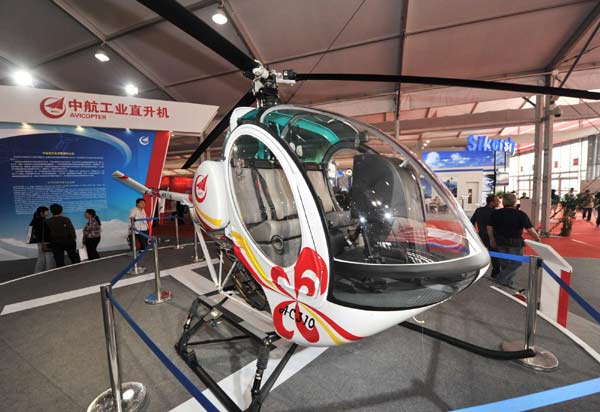|
 |
|
The one-tonne AC310 helicopter, equipped with a fuel-efficient engine and flexible rotor system, can carry two to three passengers and cruise at up to 159 km per hour, according to the Aviation Industry Corporation of China (AVIC).
|
TIANJIN - The first ultra-light civil helicopter manufactured in China made its debut Thursday at the first China Helicopter Exposition, which runs from Thursday to Sunday in the northern port city of Tianjin.
The one-tonne AC310 helicopter, equipped with a fuel-efficient engine and flexible rotor system, can carry two to three passengers and cruise at up to 159 km per hour, according to the Aviation Industry Corporation of China (AVIC), which developed and manufactured the ultra-light helicopter.
The aircraft can be deployed for emergency rescue, environmental monitoring, flight training, and private use, said Wang Bin, president of Avicopter Corporation Limited, a joint venture between AVIC and the Tianjin municipal government.
"Aimed at China's expanding private aircraft market, the ultra-light helicopter is designed for the public -- the middle-class and helicopter lovers," Wang said.
The AC310 made its maiden flight in late August and is expected to get an aircraft type certificate from Chinese civil aviation authorities next May, he said.
The helicopter is priced at 3.5 million yuan (541,100 U.S. dollars), affordable to China's rich and flying clubs, Wang added.
The state-owned aircraft maker produces civil helicopters that weigh from one to 13 tonnes. Its two-tonne AC311 made its maiden flight last November, and its 13-tonne AC313 soared to an altitude of 8,000 meters during a flight trial 10 days ago, according to AVIC.
Right after the debut ceremony, the Avicopter signed deals to sell three one-tonne AC310, three two-tonne AC311 and two 13-tonne AC313 respectively to Beidahuang General Aviation Co., Erdos General Aviation Co. Ltd. and HK Seasons General Merchandise Group Share Ltd.
The expo is organized by the Administrative Committee of Tianjin Port Free Trade Zone, the Administrative Committee of the Airport Economic Area of Tianjin, the Aviation Industry Corporation of China Helicopter Co., and France Advanced Business Events Group.
American and European helicopter giants also showed up at the helicopter exposition, including Sikorsky and Bell Helicopter Textron from the United States, Eurocopter from France and AgustaWestland from Italy.
More than 200 companies from over 20 countries and regions are attending the exposition.
China, the world's second-largest economy, reportedly ranks the No. 4 by the number of dollar millionaires, and according to the Global Fortune Report 2011, rich Chinese have particular interests in private aircraft.
However, some problems have hindered China's private aircraft business, foreign and Chinese exhibitors said.
Due to strict regulations on low-altitude airspace, private pilots have great difficulty to get flying approval, said Li Ruiyi, general manager of China Flying-Dragon General Aviation Company.
But the country is currently amending its airspace regulations and is expected to ease control on low-altitude airspace nationwide by 2015.
China needs to build more helipads and airports for private aircraft to take off and land. The helipads and airports should also be able to provide proper maintenance for the aircraft, said Yu Feng, general manager of AVIC Changhe Aircraft Industries Group Co. Ltd in east China's Jiangxi Province.
Li Ruiyi considered the shortage of pilots to be a hurdle that Chinese private aircraft business has to jump over.
According to Li, more than 600,000 people own flying licenses in the United States, compared with 20,000 in China.
The number of flying trainers is also limited, and the majority of them work in institutes that mostly offer pilots training for commercial licenses, Li said.
Industry insiders attributed inadequate amounts of after-sale service providers as another problem constraining Chinese private aircraft business.
The shortage of maintenance technicians was an issue the industry needed to address as the market in China has begun to grow, said Christophe Nurit, vice president of Sikorsky Asia.
Most private buyers would like to entrust their aircraft maintenance to professional companies, but technicians were not enough at present, Li told Xinhua.
However, Yu Feng said current shortages would not hammer down the emerging private aircraft market.
"The future of the private aircraft business is bright, as so many better-off people want to have their own aircraft," said Yu.
|

